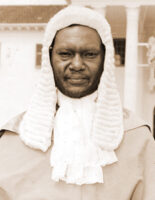
Mathew Guy Muli served as Attorney General and one of Kenya’s most distinguished jurists. He earned himself a place in the country’s history as the man who sacked himself! In an unprecedented action, Muli tabled a Government Bill in Parliament in 1987 that effectively removed the security of tenure of judges. A few years later, he was appointed Judge of the Court of Appeal.
Muli’s action shocked Kenyans and the international community. However, in the context of what was going on in the country at the time, the move could be explained. The political climate was characterised by heightening clamour for democratisation through the introduction of plural politics and respect for human rights, which led to widespread political arrests and detentions.
In 1979, a year after founding President Jomo Kenyatta died, President Daniel arap Moi appointed Muli as a High Court judge. Justice Muli termed the appointment as “unexpected and welcome”. Four years later, in January 1983, he became Kenya’s fourth AG, taking over from Joseph Kamere who had served as AG for two years. This was a time when Kenyans were beginning to call, albeit underground, for increased democratic space in the country through multipartism.
Muli served as the Government’s chief adviser for eight years between 1983 and 1991. When he was appointed, hopes were high that he would institute the badly needed reforms in the country’s judicial system. This he did, and his work was applauded around the country.
During his tenure as AG Muli recorded several successes. The speed at which inheritance cases were processed increased, by-laws were introduced to facilitate access to facilities by the physically handicapped, access to birth and death certificates was improved by separating the Department of Public Trustees from the AG’s office, the Extra Mural Penal Employment System was introduced to decongest prisons, and the Council for Higher Education was introduced to facilitate establishment of more private universities.
He also re-introduced the death penalty through an amendment of the Constitution. Most Kenyans were opposed to this move as it meant that people accused of committing capital offences could not receive bail and the sentence for a guilty verdict was death. This provision was removed from the Constitution of Kenya 2010.
Most of Muli’s achievements truly had a positive impact on many Kenyans. But these achievements were overshadowed by accusations that he was using “legal dictatorship” to silence political “dissidents” jailed as Mwakenya suspects. He was also accused of influencing verdicts by making prejudicial statements before judges made their rulings. The AG was further accused of letting the Government get away with murder in cases such as the controversial deaths of Minister for Foreign Affairs Robert Ouko and outspoken Anglican Bishop Alexander Muge.
The Mwakenya movement was accused of plotting to overthrow the Government. During the Mwakenya Trials of 1989 sedition and treason charges were levelled against many members of the movement. Others were detained without trial.
Muli was often accused of not taking appropriate actions to ensure that justice was served during “political” cases. The perception was that he was more concerned with his loyalty to the Head of State and Government than with the administration of justice.
This perception was reinforced whenever swift legal action was taken against anyone the President accused of plotting to overthrow the Government. University students, politicians, journalists and non-government organisation activists were among those arrested and charged with treason. The AG sometimes appeared in court to prosecute some of the high profile cases himself.
His actions appeared to go against the constitutional mandate and functions of the AG which make him “the Government’s principal legal adviser” and “promoter of the rule of law and defender of the public interest”.
Muli was born in 1929 in Sengani, Kangundo, in Machakos District (now Machakos County). He became a distinguished Kenyan jurist, serving as legal counsel to the East African Community, Judge of the High Court, Attorney General and Judge of the Court of Appeal.
He went to Sengani Primary School for his basic education before joining Machakos Boys High School, a stone’s throw from Machakos Town. He then moved to Alliance High School in Kiambu District before proceeding to Makerere University College in Uganda for a law degree. He graduated in 1952.
Muli returned to Kenya and was employed as a High Court interpreter and librarian. He also served as a court clerk. Intent on achieving his rather high ambitions, he resigned in 1956 to pursue further studies.
He enrolled at Lincoln’s Inn in the United Kingdom, graduating in 1961. He returned home as the country was preparing for independence and was hired as a legal adviser to the East African Community in 1962, and later became the deputy secretary.
Apart from his career as a civil servant, Muli was a businessman dealing in real estate.
